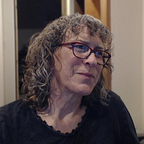I Am a Biological Woman (And a Trans Woman Too)
I have as much title to the designation as any cisgender woman
I am a transgender woman, and I am a biological woman.
There, I’ve said it. Why have I said it? Because transphobic writers are fond of invoking the term biological woman in order to deprecate transgender womanhood. And because I think it’s true. (Funny, but no one seems much interested in biological men.)
I do not say I am a biological woman to deprecate the womanhood of cisgender women, nor of other biological women of whatever relation to whatever gender or sex categories or labels as may be, but because I think I have as much title to the designation as any cisgender woman. Really. I’ll try to explain why.
What really makes a biological woman, in the sense in which transphobic writers use the term in their trans-bashing screeds? Not a comprehensive assessment of anyone’s specific manifestation of the matrix of available sexually differentiated developmental pathways, certainly. Nobody knows all the details of their own biological sex, how closely the development of their cells, their organs, the various operational systems of their bodies, approximates an idealized abstraction of “male” or “female”. Rather, when we refer to “biological sex”, we refer to a subset of the whole universe of bodily systems and components that are, to one degree or another, sexed. Our choice of what factors we will include in that subset is situationally determined.
When a transphobic writer speaks of biological women, they generally are referring to women assigned female at birth. They could hardly be referring to anything else, since to refer to anatomical details would produce the unhappy result of excluding a small but significant number of cisgender women from the category biological women — those who are lacking one or more of the characteristics of the fertile, menstruating archetype of biological woman.
I know that people who use the term biological woman in the sense I am criticizing do not like the term “assigned female at birth”, but it is an accurate descriptor of what occurs in the sexing of a newborn. Someone present at the birth makes an observation of superficial anatomy, and either makes a note on some official document or directly routes the child into a gender-specific developmental pathway. After that, the growing child will probably be monitored and guided according to gender-specific norms for some years, without significant further investigation or consequences of specific sexual anatomy. Eventually both investigation and consequences will come, of course, but not before the child is well-socialized in a particular set of gender roles and expectations.
Eventually some child, sexed at birth as female and socialized in feminine roles and expectations, will grow up to be a biological woman. As long as she does not rebel too much against that identity, she will continue to be a biological woman, for the purposes of the transphobic writer, regardless of her internal anatomy, her genetics, or her medical history. (Unless, of course, some transphobes really do want to exclude a significant population of cisgender women from “real” womanhood.)
The implication of all this, indeed, I would argue, the inescapable conclusion, is that biological woman is a social category that leans somewhat on biology, without fully understanding or embracing biological realities.
I am a biological woman. I claim my place in that social category. I am as sure of my womanhood as any cisgender woman. The evidence of my femaleness is at least as substantial as the superficial anatomy of a newborn. It is probable that my perception of my own sex has an origin in developmental physiology; certainly it seems a reasonable default hypothesis. What else would it be, since I’ve been aware of my femaleness in some sense more or less since I became aware of the configuration of my pee-pee?
The central point of this essay is not that transgender identity is rooted in biological factors, though I expect it generally is. The central point is that appropriation of the term biological woman by transphobes is disingenuous. Biological woman, as they use it, actually refers to a constellation of experiential commonalities that are cherry-picked from among the whole universe of female experience. It is nothing more than a sophistic trope used to exclude “defective” women.
